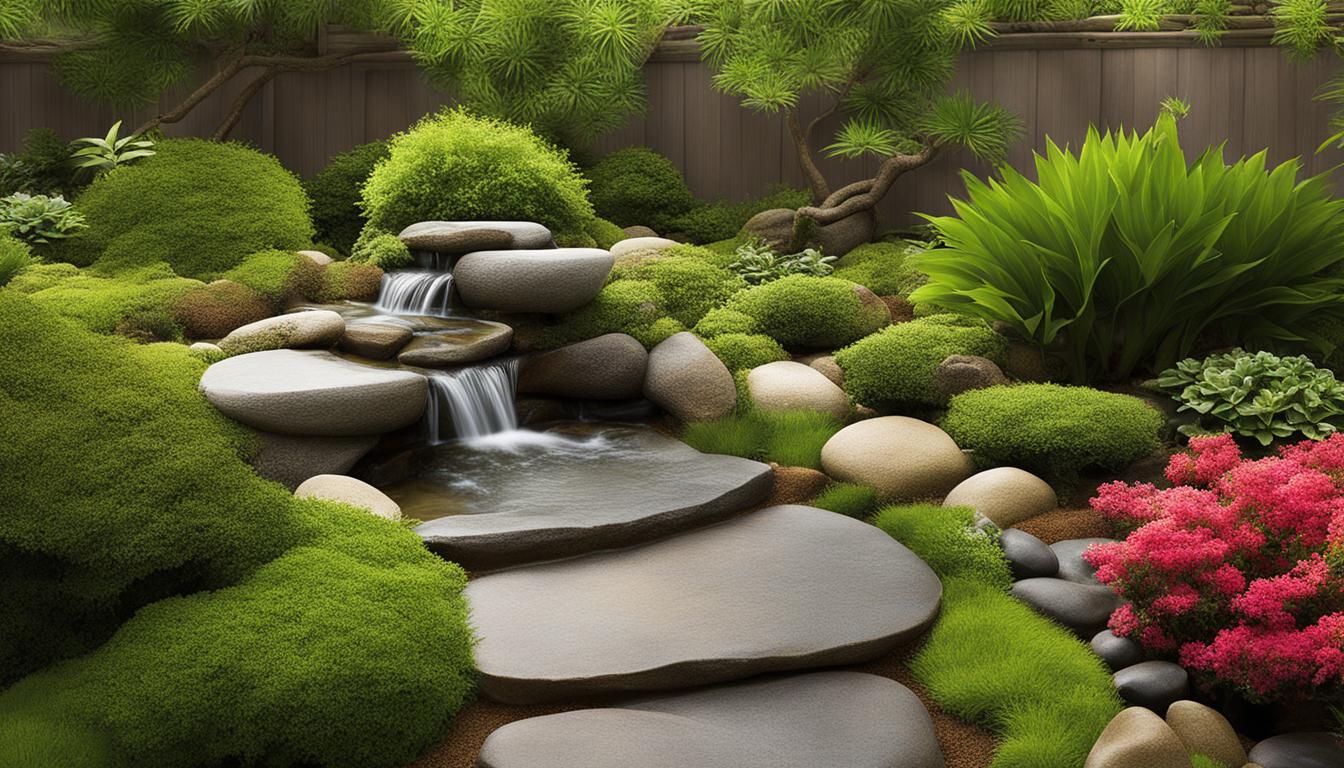Originally posted on October 28, 2023 @ 11:33 pm
Do you want to create a serene and harmonious outdoor living space? Look no further than feng shui principles to help you balance the energy in your garden and transform it into a peaceful sanctuary. In this comprehensive guide, we will explore various ideas para jardines feng shui that will enable you to create a garden that nurtures your mind, body, and spirit.
From understanding the core principles of feng shui to incorporating the five elements in your garden design, we’ve got you covered. You’ll discover the power of plants in feng shui, how to create a sense of zen with meditation areas, how to balance yin and yang energies in your garden, and much more.
Key Takeaways:
- Applying feng shui principles can help you create a harmonious garden
- Understanding the core principles of feng shui is essential to create a balanced garden layout and design
- Plants can help attract positive energy to your garden
- The five elements of feng shui should be incorporated into your garden design
- You can create a sense of tranquility in your garden by incorporating water features and meditation areas
Understanding Feng Shui for Gardens
If you’re looking to create a harmonious outdoor space, incorporating feng shui principles can help you achieve the desired balance and energy flow. But before we dive into the different ideas para jardines feng shui, let’s first understand the core principles of feng shui for gardens.
The Fundamentals of Feng Shui Garden Layout
Feng shui is all about creating a balanced and harmonious environment by optimizing the flow of energy, or chi. In the context of a garden, this means designing a layout that allows for the smooth movement of chi throughout the space.
Here are some feng shui garden layout principles to keep in mind:
- Create curved paths and walkways to encourage the flow of chi, instead of straight paths that create stagnant energy.
- Use garden structures, such as trellises and archways, to guide the chi and create focal points in the garden.
- Position garden furniture and decor with intention, ensuring they don’t obstruct the flow of chi.
Elements and Their Significance
In feng shui, there are five elements that represent different energies: wood, fire, earth, metal, and water. Each element has a specific significance and can be incorporated into your garden design to create balance and harmony.
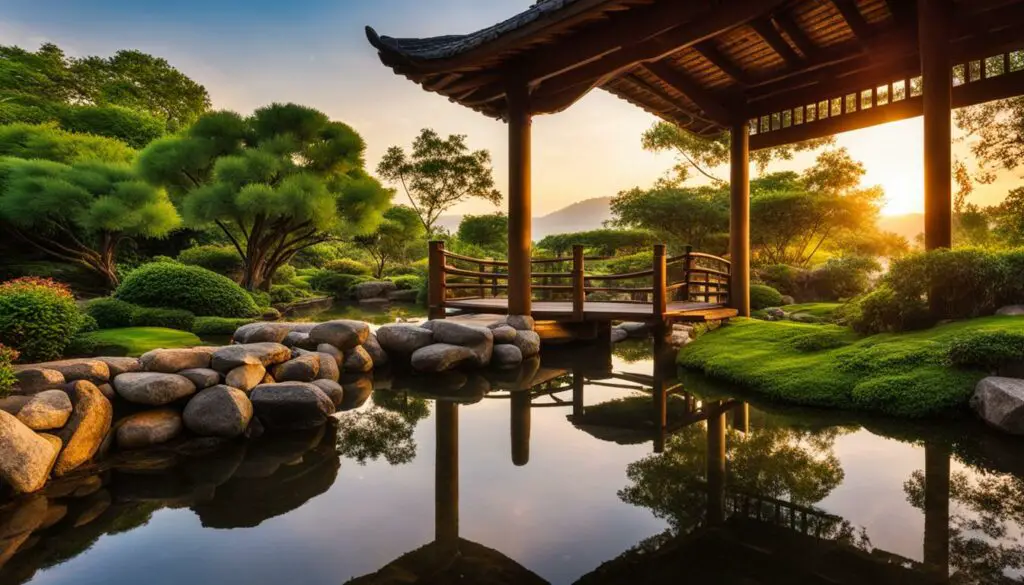
Here’s a brief overview of each element:
| Element | Significance | How to Incorporate |
|---|---|---|
| Wood | Growth and vitality | Plant lush greenery and trees. |
| Fire | Passion and transformation | Use warm and bold colors such as red and orange. |
| Earth | Stability and nurturing | Add earthy elements, such as rocks and clay pottery. |
| Metal | Precision and clarity | Use metal decor and accents, such as sculptures and wind chimes. |
| Water | Flow and flexibility | Add water features, such as fountains and ponds. |
Feng Shui Garden Ideas
Now that you have a better understanding of the principles behind feng shui garden layout and the significance of the five elements, how can you incorporate these ideas into your own outdoor space? Here are some feng shui garden ideas to get you started:
- Create a focal point in your garden by adding a water feature or statue.
- Choose feng shui plants that promote positive energy, such as bamboo and lavender.
- Hang wind chimes or bells to encourage the flow of chi.
- Add outdoor lighting to create a warm and inviting atmosphere in the evening.
- Incorporate natural materials, such as wood and stone, to bring a sense of balance and harmony to your garden.
By incorporating these feng shui garden ideas, you can create a beautiful and harmonious outdoor space that promotes positive energy and tranquility. Stay tuned to discover more ways to transform your garden into a feng shui sanctuary.
Harnessing Positive Energy with Feng Shui Plants
Plants are an essential part of any garden, but did you know that they can be used to maximize positive energy flow in your outdoor space? Feng shui has long recognized the power of plants in promoting balance and tranquility. By incorporating certain feng shui plants in your garden, you can enhance the flow of energy and create a more peaceful environment.
“Plants are our friends and bring joy, happiness, and positive energy to our lives,” says feng shui expert, Rodika Tchi.
So, how can you harness the positive energy of feng shui plants in your garden? Here are some tips:
Choose the right plants
When selecting plants for your garden, consider those that are known for their positive impact on energy flow, such as:
- Bamboo – represents strength and resilience
- Lavender – promotes relaxation and calmness
- Jasmine – attracts positive energy and good fortune
- Mint – refreshes and revitalizes energy
Remember, choosing plants that are native to your area will also promote harmony and balance in your garden.
Positioning plants for optimal energy flow
Where you place your feng shui plants is just as important as which plants you choose. Consider placing plants near areas where energy is lacking or stagnant, such as corners, entrances, or near man-made structures. Additionally, placing plants in clusters or in areas of the garden where energy flow is strong can help balance the overall energy of the space.
Using colors to enhance the energy flow of your garden
In feng shui, each color represents a different element and has a unique effect on energy flow. When selecting feng shui plants, consider their color and how it will enhance the energy flow of your garden. For example, red represents fire and can be used to energize and stimulate, while blue represents water and promotes calmness and clarity.
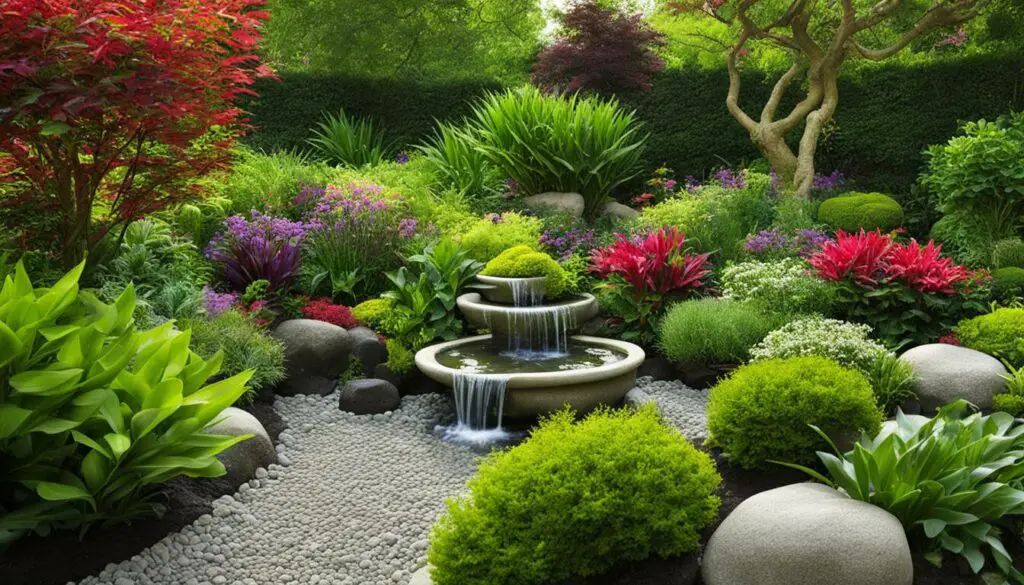
By incorporating feng shui plants in your garden and positioning them strategically, you can elevate the energy flow and enhance the overall harmony of your outdoor space.
Incorporating the Five Elements in Your Garden Design
In feng shui, the five elements – wood, fire, earth, metal, and water – play a crucial role in creating a harmonious and balanced environment. Each element has its symbolism and represents a unique energy. When designing your garden with feng shui principles, it’s essential to incorporate all five elements in a balanced way to achieve optimal energy flow.
The table below showcases the five elements, their corresponding symbolism, and how to incorporate them into your garden:
| Element | Symbolism | Incorporation in Your Garden |
|---|---|---|
| Wood | Growth, expansion, flexibility | Plant trees and shrubs, use wooden features such as benches and pergolas |
| Fire | Passion, transformation, creativity | Add lighting fixtures, use warm colors, incorporate fire pits or torches |
| Earth | Stability, grounding, nourishment | Use earthy tones, add stones or boulders, incorporate pottery and ceramics |
| Metal | Precision, clarity, efficiency | Use metal fixtures such as gates and trellises, incorporate metal sculptures or wind chimes |
| Water | Calmness, purity, clarity | Add water features such as fountains or ponds, use reflective surfaces like mirrors or glass |
When incorporating the five elements, it’s important to have a good balance and avoid overemphasizing any one element. Each element should flow seamlessly into the next to create a harmonious and inviting space.
By balancing the five elements in your garden, you can create an environment that promotes positive energy flow and enhances your overall sense of well-being.
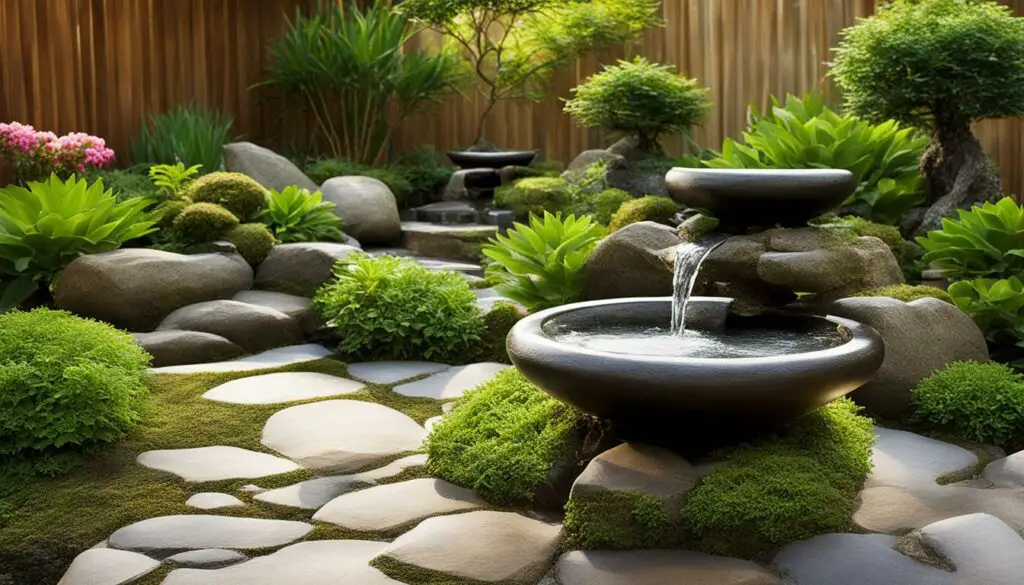
Creating a Feng Shui Sanctuary in Your Garden
Creating a feng shui sanctuary in your garden is the perfect way to cultivate a space for peace and relaxation. By incorporating feng shui principles, you can balance the energy in your garden and create a welcoming atmosphere. Here are some tips for creating a feng shui sanctuary in your garden:
- Choose calming colors: Incorporating calming colors like blues, greens, and purples can create a peaceful atmosphere. Consider adding these colors through flowers, decor, or furniture.
- Add soothing water features: Water is a powerful element in feng shui, and incorporating a water feature can enhance the energy flow in your garden. Consider adding a small fountain or pond to create a calming ambiance.
- Create a meditation area: A meditation area can be a dedicated space for relaxation and reflection. Consider adding a bench or small seating area surrounded by plants and flowers.
- Use natural materials: Incorporating natural materials like stone, wood, and bamboo can help create a grounded and harmonious feel to your garden.
- Include meaningful decor: Consider adding decor that has personal meaning to you, such as wind chimes, statues, or symbols. These can help inspire and uplift you while spending time in your garden.
By incorporating these tips, you can create a feng shui sanctuary that brings a sense of peace and harmony to your outdoor living space.
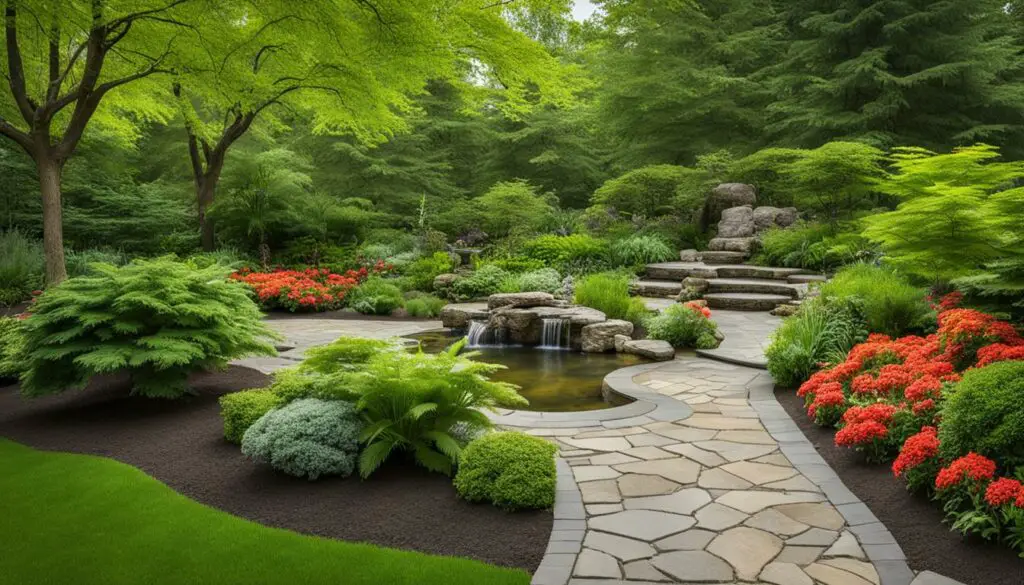
Enhancing Energy Flow with Pathways and Walkways
The layout of your garden can have a significant impact on the energy flow and overall atmosphere. By incorporating well-designed pathways and walkways, you can optimize the flow of energy and create an inviting space. Here are some feng shui garden layout and landscaping tips for enhancing energy flow:
1. Create a Clear Path
Make sure the paths in your garden are clear and unobstructed. Remove any clutter, debris, or overgrown plants that may be blocking the energy flow. A clear path not only enhances the energy flow but also creates a sense of order and calmness.
2. Use Curved Shapes
Curved shapes are known to promote the flow of energy and create a sense of harmony. When designing your pathways and walkways, consider incorporating curves and circles to encourage the energy to move freely.
3. Add Lighting
Lighting is an excellent way to enhance the energy flow in your garden and create a warm and inviting atmosphere. Use soft, ambient lighting along your pathways and walkways to illuminate the way and highlight the beauty of your garden.
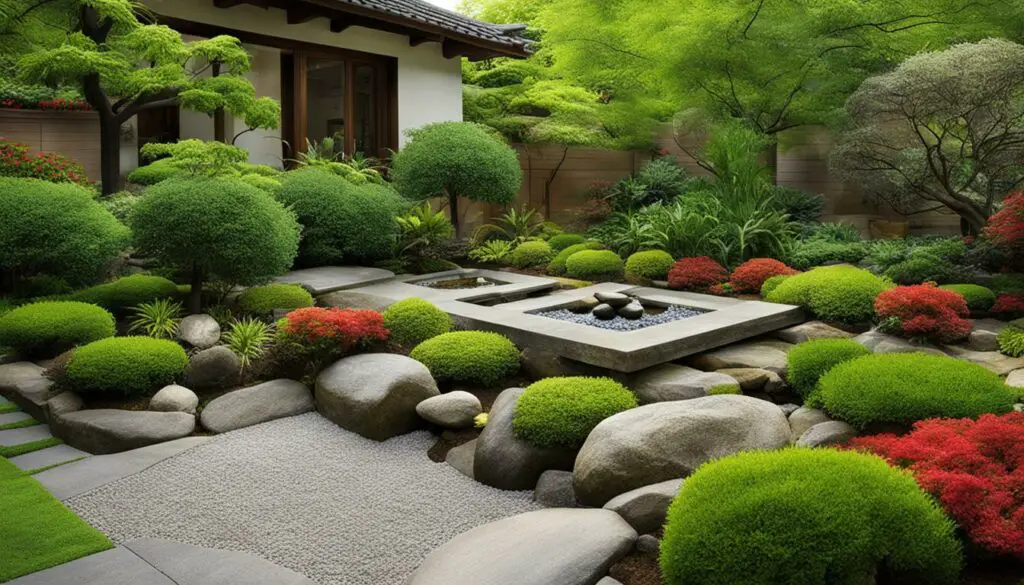
4. Embrace Natural Materials
Using natural materials such as stone, gravel, or wood can help create a sense of balance and grounding in your garden. Consider using natural materials in your pathways and walkways to enhance the energy flow and create a cohesive look.
5. Use Plants to Soften Edges
Softening the edges of your paths with plants can create a smooth transition between the different areas of your garden. Use plants with soft, flowing textures to create a sense of movement and harmony.
By following these feng shui garden layout and landscaping tips, you can create pathways and walkways that optimize the energy flow in your garden. A well-designed path not only enhances the beauty of your garden but also creates a sense of tranquility and balance.
Harmonizing Outdoor Spaces with Feng Shui
When it comes to feng shui, outdoor spaces are just as important as indoor spaces. To create a harmonious and balanced outdoor living area, it’s essential to apply feng shui principles to your patio, balcony, or backyard. Whether you’re looking to create a relaxing retreat or an inviting space for social gatherings, these feng shui outdoor spaces ideas will help you achieve your goal.
Define Your Outdoor Space
Start by defining your outdoor space with furniture, lighting, and color. Choose furniture with soft, curved lines, and avoid placing it in direct alignment with doors or pathways. Use lighting to create a warm and inviting atmosphere, and select colors that promote calmness and relaxation, such as blues, greens, and earth tones.
Embrace Nature
Incorporating natural elements into your outdoor space is key to feng shui outdoor spaces. Consider adding plants, water features, and rocks to create a tranquil environment. Use fountains and water elements to bring a sense of calmness, while plants and flowers can help to attract positive energy.
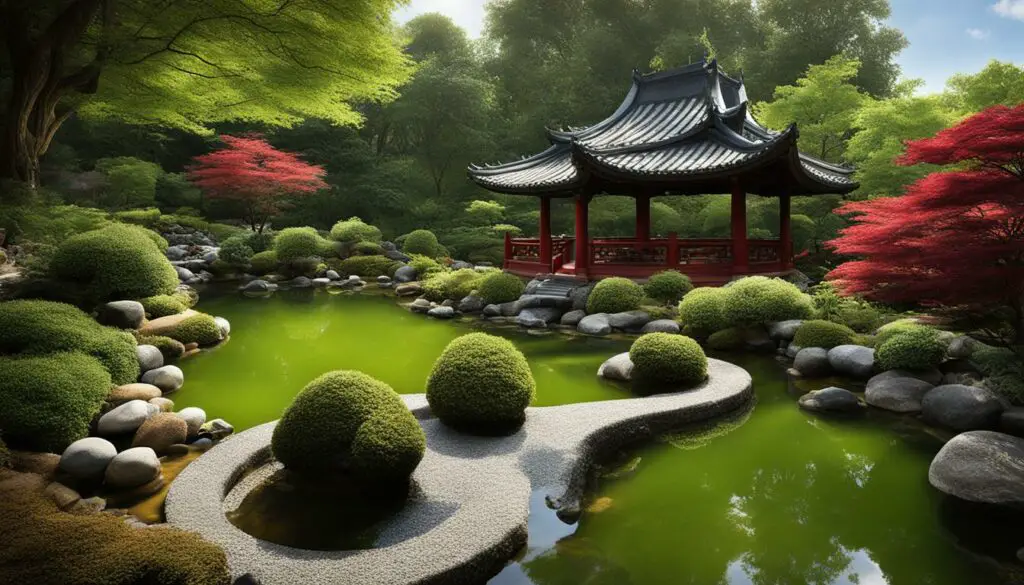
Create a Seating Area
A seating area is an essential component of any outdoor space. Place chairs and benches in a circular or square arrangement to encourage conversation and connection with others. Don’t forget to add comfortable cushions and blankets to make your seating area cozy and inviting.
Optimize Energy Flow
Just like in your home, energy flow is crucial in your outdoor space. Avoid clutter and ensure pathways are clear to create an easy and intuitive flow. Place outdoor decorations and plants in areas that balance the energy in your space, and avoid sharp lines or angles that can create negative energy.
Keep it Clean
Maintaining a clean and clutter-free outdoor space is vital to promoting positive energy. Regularly remove any debris, such as fallen leaves or dirt, and keep pathways clear. Keep outdoor furniture and accessories clean and in good condition, and avoid storing unnecessary items outside.
- Define your outdoor space with furniture, lighting, and color
- Incorporate natural elements like plants, water features, and rocks
- Create a comfortable seating area
- Optimize energy flow with clear pathways and balanced decorations
- Maintain a clean and clutter-free space
Creating Balance with Water Features
Incorporating water features into your garden design can have a powerful impact on the energy flow and overall ambiance of your outdoor space. Water is a symbol of abundance and prosperity in feng shui, and implementing it in your garden can help to balance the energy and enhance positive vibes.
There are several ways to introduce water into your garden, from tranquil ponds to soothing fountains. When selecting a water feature for your garden, consider the space available, your budget, and the overall aesthetic you wish to create.
Types of Water Features
| Water Feature | Benefits | Placement |
|---|---|---|
| Ponds | Adds a sense of calm and tranquility, attracts wildlife | Preferably in the east, southeast, or north areas of your garden |
| Fountains | Creates a soothing sound, enhances the energy flow | Preferably in the north, east, or southeast area of your garden |
| Birdbaths | Attracts birds, adds a sense of life and movement to your garden | Preferably in the east or southeast area of your garden |
When designing your water feature, keep in mind the balance of yin and yang energies. Yin water is still and reflective, while yang water is active and flowing. Your water feature should be balanced to create harmony, with a mix of both yin and yang elements.
Another important consideration is the direction of water flow. Water should flow towards your home, rather than away from it, to encourage the flow of positive energy and abundance towards your living space.
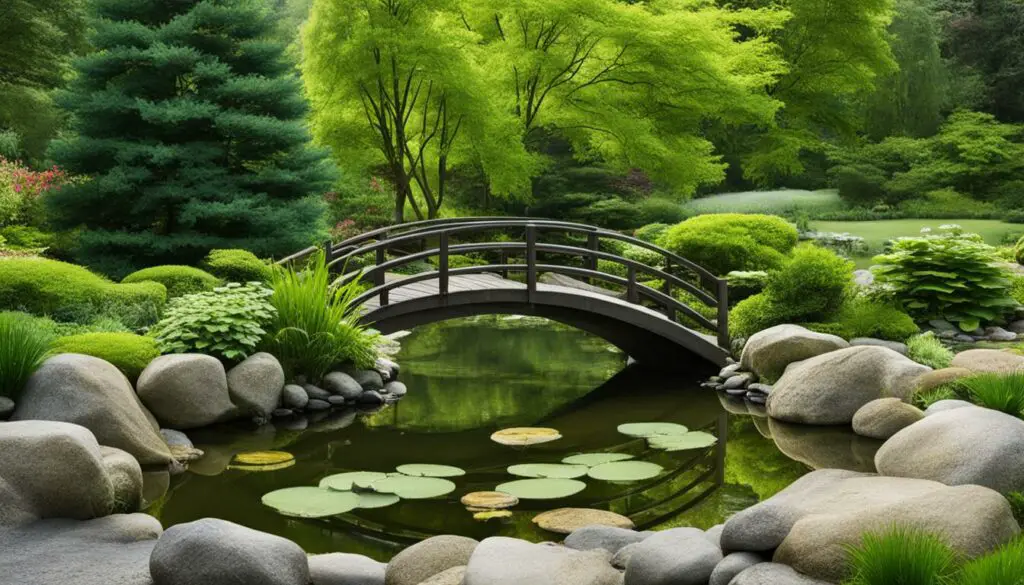
As with all feng shui elements, maintenance is key. Keep your water feature clean and well-maintained, with no stagnant water or debris. Regularly clean the pump or filter to ensure the water flows smoothly and contributes to the positive energy in your garden.
With the right water feature and placement, you can create a soothing and balanced outdoor space that promotes relaxation and tranquility.
Cultivating a Sense of Zen with Meditation Areas
Creating a meditation area in your garden is an excellent way to add a sense of calm and balance to your outdoor space. With the use of feng shui principles, you can design a space that promotes relaxation and mindfulness. Here are some feng shui garden layout and landscaping tips for creating a meditation area:
- Choose a peaceful location: Find a quiet corner of your garden where you can relax without distraction. Create a sense of privacy with the use of plants or garden screens.
- Create a focal point: Choose a central feature for your meditation area, such as a statue, a fountain, or a tree. This will help to draw the eye and focus your attention during meditation.
- Use the right materials: Use natural materials like wood, stone, and bamboo to promote a sense of calmness and harmony. Avoid materials that are too ornate or flashy.
- Add comfortable seating: Choose comfortable seating, like a cushioned bench, a yoga mat, or a meditation cushion. This will help you to sit comfortably for long periods.
- Incorporate feng shui plants: Choose plants that promote positive energy and relaxation, like lavender, jasmine, or bamboo. Place them strategically around your meditation area to create a soothing atmosphere.
Remember that your meditation area should be a place of tranquility and serenity, free from distractions and clutter. With these feng shui tips, you can create a peaceful space in your garden that promotes mindfulness and relaxation.
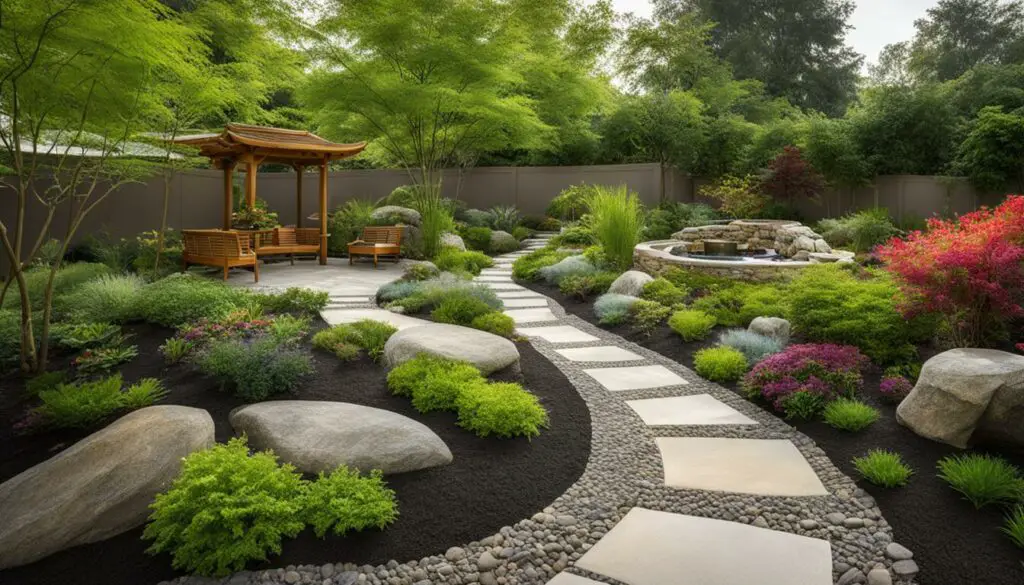
Creating Balance with Yin and Yang Energies in Your Garden
One of the key principles of feng shui is the concept of yin and yang energies. Yin energy is associated with softness, darkness, and curved shapes, while yang energy represents strength, light, and straight lines. Balancing these two energies in your garden is essential for creating a harmonious and peaceful outdoor space.
Start by evaluating your garden’s current layout and design. Look for areas that may be too yin or too yang and consider ways to balance them out. For example, if you have a lot of straight lines and sharp angles in your garden, you can add some yin energy by incorporating curved pathways or using circular planters.
Conversely, if your garden is overly yin with too many curves and softness, you can add some yang energy by incorporating more straight lines and geometric shapes. This can be achieved through the use of raised beds or incorporating hardscaping elements like walls or fences.
Elements for Balancing Yin and Yang Energies
Incorporating the five elements of feng shui is also important for balancing yin and yang energies in your garden. Here are some examples of how to use each element:
| Element | Description | Example |
|---|---|---|
| Wood | Represents growth and vitality. | Adding a wooden trellis for climbing plants. |
| Fire | Represents passion and energy. | Using red flowers or outdoor lighting. |
| Earth | Represents stability and grounding. | Using natural stone or incorporating a rock garden. |
| Metal | Represents clarity and precision. | Incorporating metal sculptures or using metal planters. |
| Water | Represents flow and abundance. | Adding a small fountain or water feature. |
By incorporating these elements in your garden design, you can achieve a balance of yin and yang energies for optimal harmony and tranquility.
Feng Shui Landscaping Tips
- Use plants with varying heights and textures to create visual interest and balance.
- Position furniture in a way that encourages relaxation and contemplation, such as facing a water feature or a meditation area.
- Avoid clutter and maintain a clean and organized garden to promote positive energy flow.
- Consider the direction and placement of your garden in relation to your home and other outdoor spaces to enhance the overall energy flow.
By following these feng shui landscaping tips and incorporating the principles of yin and yang energies into your garden design, you can cultivate a peaceful sanctuary that nourishes your mind, body, and spirit.
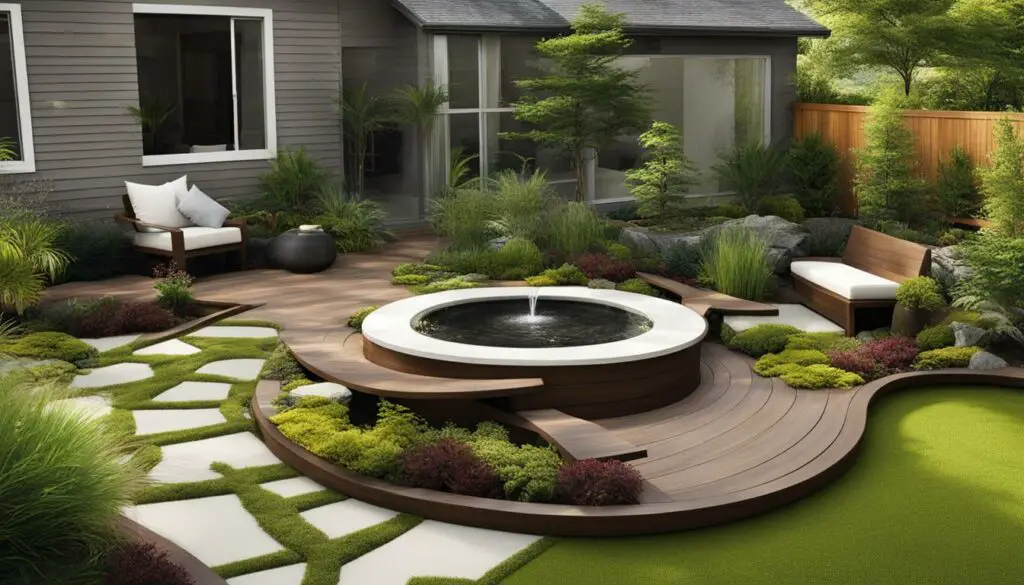
Encouraging Wildlife and Nature in Your Garden
Creating a garden that encourages wildlife and embraces the beauty of nature is a wonderful way to promote positive energy and harmony in your outdoor space. Follow these garden design tips with feng shui principles to attract birds, bees, and butterflies to your garden.
Choose Native Plants
Choosing native plants is not only beneficial for the environment, but it also ensures that your garden aligns with feng shui principles. Native plants support the local ecosystem and attract pollinators, which help to create a healthy and balanced garden. Use plants that are appropriate for your region and are adapted to the local climate.
Create Habitat for Wildlife
Create habitats to attract birds, bees, and butterflies to your garden. Install birdhouses, bee boxes, and butterfly shelters to provide safe homes for wildlife. Incorporate water features such as a small pond or fountain to provide a water source for birds and other animals. A small bird bath will also attract birds and provide a focal point for your garden space.
Plant Trees and Shrubs
Trees and shrubs provide shelter and nesting sites for birds and other wildlife. They also offer food sources such as berries and seeds. Incorporate different varieties of trees and shrubs into your garden to create a diverse and healthy ecosystem. Use feng shui landscaping tips to position trees and shrubs in the right location to promote positive energy flow.
Avoid Chemicals and Pesticides
Avoid using chemicals and pesticides in your garden as they disrupt the natural balance of the environment. Instead, use natural methods such as companion planting and biological controls to manage pests and promote a healthy garden. Not only is this more eco-friendly, but it also aligns with feng shui principles by promoting a natural and harmonious environment.
| Beneficial Plants for Your Garden | Attracts | Description |
|---|---|---|
| Lavender | Butterflies, Bees, Birds | A fragrant plant with beautiful flowers. Attracts pollinators for a healthy garden. |
| Sunflower | Butterflies, Bees, Birds | A tall, showy plant that attracts pollinators. The seeds also provide food for birds in the fall. |
| Salvia | Butterflies, Bees, Birds | A colorful plant with tubular flowers. Attracts hummingbirds and butterflies to your garden. |
By following these garden design with feng shui principles, you can create a beautiful and harmonious garden that promotes positive energy and attracts wildlife. Embrace the beauty of nature and cultivate a garden that you can enjoy for years to come.
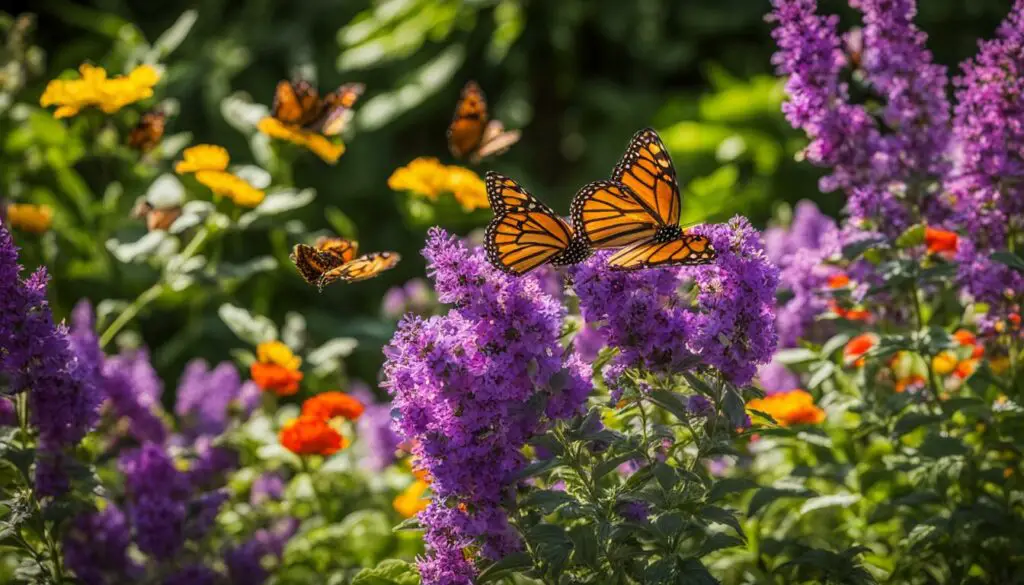
Creating Balance with Water Features
Water features can be a great addition to any garden, especially when designing with feng shui principles in mind. They not only enhance the overall beauty of your garden but can also bring balance and positive energy to your outdoor space.
When selecting a water feature, consider the size of your garden and the amount of space you have available. A small fountain or bird bath can bring a sense of serenity and calmness, while a larger pond or waterfall can create a dramatic and striking feature.
It’s important to position your water feature in the correct location to maximize its benefits. According to feng shui principles, water represents wealth and abundance, so placing your water feature in the southeast corner of your garden can attract prosperity and good fortune.
Another feng shui tip when designing with water features is to ensure that the water flows towards your home rather than away from it. This is believed to bring positive energy towards your living space.
When it comes to maintaining your water feature, keep the water clean and free of debris to prevent stagnant energy from building up. Regularly clean the pump and filter, and ensure that there is a balance between the amount of water flowing in and out of the feature.
Incorporating a water feature can enhance the overall balance and harmony in your garden, creating a peaceful and relaxing outdoor space that promotes positive energy.
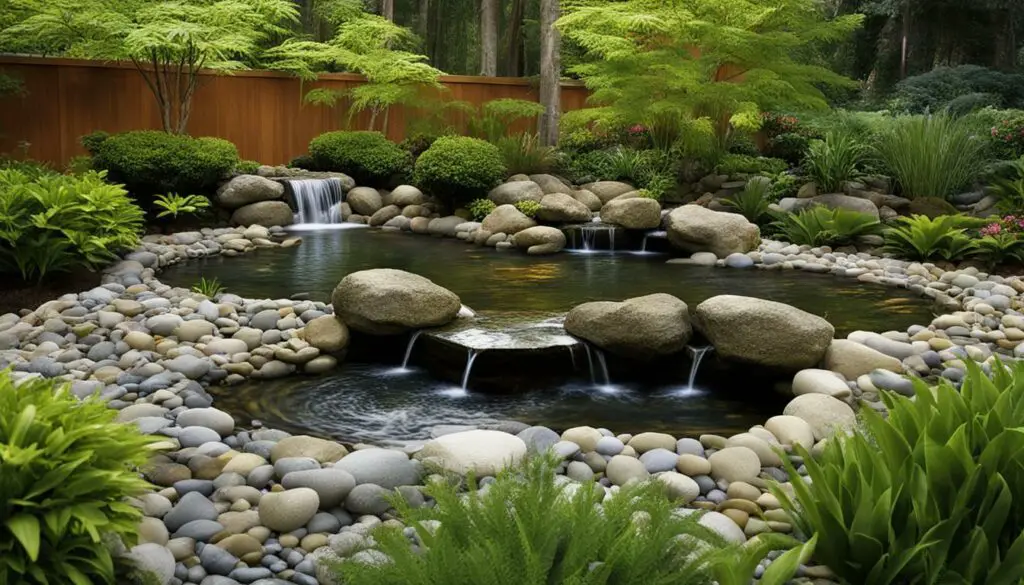
Section 13: Maintaining Harmonious Garden Energy
Now that you’ve implemented various feng shui ideas in your garden, it’s important to maintain the positive energy and harmony you’ve created. Here are some feng shui garden layout and landscaping tips to keep your outdoor space in balance:
- Regularly prune trees and shrubs to prevent overgrowth and maintain clear pathways.
- Remove dead or diseased plants and replace them with healthy ones to keep the energy flowing.
- Declutter your garden regularly by removing any unnecessary items that do not serve a purpose or have sentimental value.
- Use mindful gardening practices, such as using natural fertilizers and avoiding chemicals, to promote a healthy and sustainable garden.
By taking these simple steps, you can continue to cultivate a beautiful and harmonious outdoor space that promotes relaxation and positive energy.
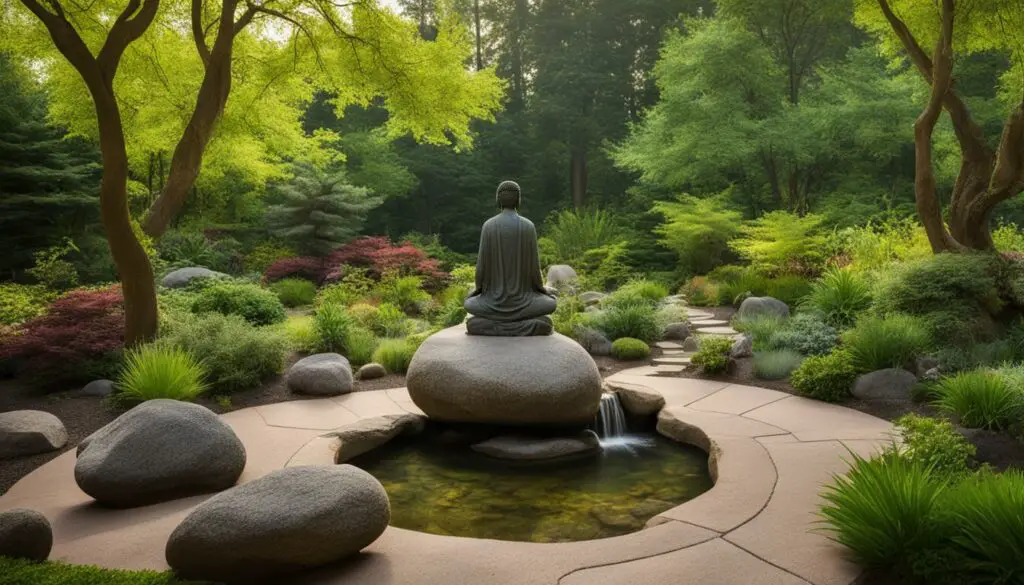
The Benefits of Mindful Gardening Practices
Mindful gardening practices not only help to maintain a harmonious garden but also have additional benefits. By avoiding the use of chemicals and focusing on natural fertilizers, you can create a healthier and more sustainable garden environment. This can lead to healthier soil, better plant growth, and a more vibrant ecosystem in your outdoor space.
“Gardening is a great way to connect with nature and promote mindfulness. By taking the time to care for your garden in a mindful way, you can reap both physical and mental benefits.”
Conclusion
Transforming your garden into a harmonious and serene outdoor living space doesn’t have to be a daunting task. By applying ideas para jardines feng shui, you can create a peaceful sanctuary that nurtures your mind, body, and spirit. Remember to balance the energy in your garden using feng shui principles, incorporate the five elements, and choose plants and materials that promote positive energy flow.
Whether you want to create a zen meditation area or a wildlife-friendly garden, the principles of feng shui can be applied to any garden design. Don’t forget to optimize the energy flow with well-designed pathways and walkways, incorporate soothing water features, and use lighting to enhance the ambiance.
Take Action
Start by assessing your current garden layout and identifying areas for improvement. Consider implementing one or two feng shui principles at a time, and gradually build on your design to create a fully harmonious garden. Remember to maintain your garden by regular pruning, decluttering, and mindful gardening practices to sustain the peaceful environment you’ve created.
With these tips and ideas, you can bring harmony home and create a beautiful and balanced outdoor living space.
FAQ
What is feng shui?
Feng shui is an ancient Chinese practice that focuses on creating harmony and balance in one’s environment. It involves arranging objects and designing spaces in a way that promotes positive energy flow.
How can I apply feng shui principles to my garden?
To apply feng shui principles to your garden, you can start by considering the layout and design of your outdoor space. Pay attention to the placement of elements, such as plants, water features, and pathways, to create a harmonious flow of energy.
What are some feng shui plants that can attract positive energy?
Some feng shui plants known for attracting positive energy include bamboo, money trees, jade plants, and peace lilies. These plants are believed to bring luck, prosperity, and good fortune.
How can I incorporate the five elements of feng shui into my garden design?
The five elements of feng shui – wood, fire, earth, metal, and water – can be incorporated into your garden design by using specific materials, colors, and shapes. For example, you can use wooden furniture, fire pits, earthy tones, metal sculptures, and water features to represent each element.
How can I create a peaceful sanctuary in my garden?
To create a peaceful sanctuary in your garden, you can add calming elements such as water features, meditation areas, and comfortable seating. Choosing soothing colors and incorporating natural materials can also contribute to a tranquil atmosphere.
How can I optimize the energy flow in my garden with pathways and walkways?
To optimize the energy flow in your garden, it’s important to design pathways and walkways that are inviting and intuitive. Consider using curved paths, avoiding clutter, and creating clear routes that lead to different areas of your garden.
Can feng shui principles be applied to outdoor living spaces other than gardens?
Yes, feng shui principles can be applied to other outdoor living spaces such as patios, balconies, and rooftops. By considering the layout, furniture arrangement, and selection of decorative elements, you can create a balanced and harmonious environment.
How can water features contribute to a feng shui garden?
Water features such as fountains, ponds, or birdbaths can contribute to a feng shui garden by creating a sense of tranquility and balance. The flowing water symbolizes abundance and promotes positive energy flow.
How can I incorporate meditation areas in my garden?
To incorporate meditation areas in your garden, choose a quiet and secluded spot where you can create a peaceful atmosphere. Use natural elements like rocks and plants, and consider adding comfortable seating, cushions, or even a small zen garden.
What is the importance of balancing yin and yang energies in a garden?
Balancing yin and yang energies in a garden is crucial for creating harmony. Yin represents the feminine, soft, and passive energy, while yang represents the masculine, strong, and active energy. By achieving a balance between these energies, you can create a harmonious and inviting outdoor space.
How can I attract wildlife and embrace nature in my feng shui garden?
To attract wildlife and embrace nature in your feng shui garden, consider incorporating native plants, creating habitats for birds and butterflies, and providing food and water sources. This will encourage biodiversity and add a natural touch to your outdoor space.
How can lighting enhance the energy flow in my garden?
Lighting plays an important role in enhancing the energy flow and atmosphere in your garden. Use soft, ambient lighting to create a warm and inviting space, and strategically place fixtures to highlight important elements such as pathways or fountains.
What are some tips for maintaining a harmonious garden?
To maintain a harmonious garden, regular maintenance is important. This includes pruning plants, decluttering, and practicing mindful gardening. Keep an eye on the health of your plants and ensure that the energy flow in your garden remains balanced.
How can I transform my garden into a harmonious oasis with ideas para jardines feng shui?
By implementing ideas para jardines feng shui, you can transform your garden into a harmonious oasis. Whether through choosing the right plants, incorporating the five elements, or creating a serene sanctuary, these ideas will help you cultivate a garden that nurtures your mind, body, and spirit.
